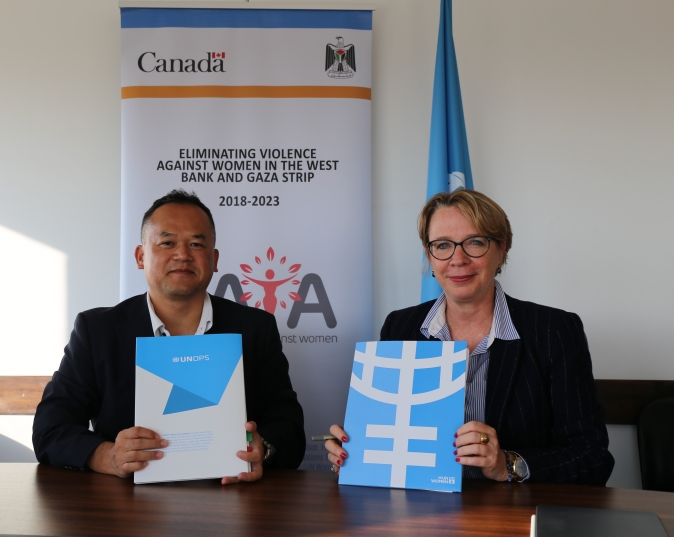Under the HAYA Joint Programme, UN Women and UNOPS partner to support high-quality gender-based violence shelters to Palestinian women and girls
Date:

Photo: UNOPS/Fidaa Maaytah
“Our joint goal is for Palestinian women and girls to have access to a full package of services that provide protection as well as support them in reintegrating into their society,” explained Ms. Maryse Guimond, UN Women Special Representative in Palestine. “To do so, we will work with local stakeholders in enhancing the quality and accessibility of these services, improving the capacity, attitudes, and behaviours of those providing this support.”
With the local actors, UNOPS will take the lead on rehabilitating and refurbishing these shelters to become more gender-sensitive, inclusive, and free of discrimination to provide higher quality services to women and girls.
“Through this joint programme, UNOPS aims to support the upgrading of the physical structure of four shelters to improve the shelters’ capacities to provide protection services to women facing violence as well as improve access to quality protection services” Mr. Tokumitsu Kobayashi, Director of UNOPS in Palestine.
Ms. Hazam Tahbub, HAYA’s Joint Programme Manager, stressed the importance of these shelters to the lives of those experiencing gender-based violence. “The HAYA Joint Programme supports shelters that provide a safe space to women and their children who are fleeing situations of abuse.” She added, “We support these shelters to maintain the privacy and safety of each resident and to provide services to meet the basic needs of survivors and their children. Through these shelters, survivors of violence can find support to meet any specialised needs including accessibility for women or children with disabilities.”
In the West Bank, 29.9 cent of ever-married women in the West Bank and 51 per cent in the Gaza Strip have experienced violence, with less than 1 per cent of them seeking government or civil society organizational support, due to the fear of stigma and social exclusion or reprisal, according to the Palestinian Central Bureau of Statistics (PCBS) 2011 Violence Survey. Violence against women is one of the most widespread and systematic human rights violations and an impediment to achieving gender equality and sustainable development overall.
For media queries, please contact:
Lisa Sabella, Media and Communication Coordinator for the HAYA Joint Programme via [ Click to reveal ] +970 595 543 236
Fidaa Maaytah, Communications Assistant at UNOPS Jerusalem Office via [ Click to reveal ] or +972 54 323 9322.
About the HAYA Joint Programme
The HAYA Joint Programme is funded by the Government of Canada and is jointly implemented by a consortium of UN agencies consisting of the United Nations Entity for Gender Equality and the Empowerment of Women (UN Women), the United Nations Population Fund (UNFPA), the United Nations Human Settlements Programme (UN-Habitat), and the United Nations Office on Drugs and Crime (UNODC). HAYA brings together the Palestinian Authority (PA), UN agencies, civil society organisations, community-based organisations, and other partners to reduce the vulnerability of women and girls to all forms of violence and from the threat of such violence. The Ministry of Women’s Affairs and the Ministry of Social Development are key partners of the HAYA Joint Programme, along with other ministries including the Ministry of Education, the Ministry of Health, the Ministry of Justice, and the Ministry of Local Government, and various municipalities, civil society and community-based organizations. HAYA seeks to end violence against women and girls through various outreach and awareness-raising activities to change harmful practices and attitudes perpetuating and validating violence, increase access to necessary services for survivors of violence, as well as strengthen the institutional capacity of government officials to develop and implement legal and policy frameworks promoting and protecting women’s and girls’ rights to live free from violence. The HAYA Joint Programme also focuses on ensuring inclusive and equitable quality education and promoting lifelong learning opportunities for all, achieving gender equality and empowering all women and girls, and making cities inclusive safe, resilient, and sustainable.
END.
The Arabic press release can be found here.